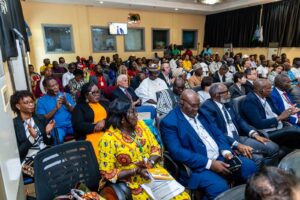Secretary-General of the Trades Union Congress (TUC) Dr. Yaw Baah observed that the Organisation of African Trade Union Unity (OATUU) was founded in April 1973 in Addis Ababa, Ethiopia to seek unity at the trade union front and protect the interests of working people in Africa.
He indicated that having attained its 50th milestone this year, Ghana is particularly proud of this remarkable feat since the country offered free space in Accra to serve as the headquarters of the OATUU.
Additionally, Ghana’s Government paid the salaries of all the technical staff of OATUU for the last 50 years and recounted a period when a number of institutions in the country were taken off government payroll and that was going to affect the OATUU also.
Immediately it came to the Secretary-General’s attention, he intervened and met the finance minister about the matter, who gracefully agreed to omit the OATUU, and even permitted the recruitment of more technical staff.
Dr. Baah noted that the theme for OATUU’s 50th anniversary is about decent work since it brings to sharp focus the greatest challenge facing the continent today. He indicated that the huge decent work deficit has forced hundreds of millions of Africans into severe poverty and destitution.

The Assistant Director-General and Regional Director for Africa – ILO, Cynthia Samuel-Olonjuwon, said it is historic to celebrate 50 years of OATUU and reflect the determination and resolve of trade union leaders to work in unity to defend the rights of African workers.
She paid tribute to trade union leaders who eventually evolved into political heads and nation-builders, like Ahmed Sekou Toure, Modibo Keita, Siaka Stevens and more recently, Cyril Ramaphosa for their activism.
She lauded OATUU’s role as a development actor and defender of workers’ rights on the continent, and the very fact that it survived ten decades makes it even more profound. She expressed pride at the consistent and effective collaboration between OATUU and the ILO.
Mrs. Samuel-Olonjuwon added that the fight for social justice is at the core of the raison d’être of OATUU but added it must add capacity-building and decent work for Africa’s youth so as to take full advantage of the demographic dividend that is in the continent’s favour.
Historically, African trade unions were an important driving force for anti-colonial liberation struggles and were influential in the struggles of many African countries.
OATUU President Dr. Francis Atwoli recounted how OATUU was founded in 1973 with the merger of three distinct Pan-African Trade Union Organisations, namely: the All-African Trade Union Federation (AATUF) based in Accra-Ghana, African Trade Union Confederation (ATUC) based in Dakar-Senegal, and the Pan-African Workers Congress (PAWC) based in Banjul-the Gambia.
He played glowing tribute to the renowned Kenyan trade unionist, Tom Mboya, who was assassinated in his prime; and John Tettehgah of Ghana, among other reputable African unionists.
Dr. Atwoli urged the younger generation to work hard to carry the legacy of OATUU forward since there remains a lot to be achieved in the area of social justice and decent work. He thanked Ghana for the support rendered OATUU and the black race for playing a pioneering liberation role.










